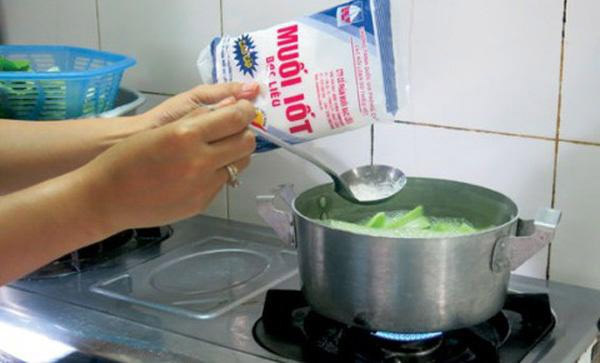90% of people eat salty, but Vietnam is still the top iodine deficiency in the world because of this habit
Although Vietnamese people eat very salty, there is no iodine in the processed spices, which is the cause of a large shortage of iodine.
Why eat salty but still lack iodine?
Recently, the National Institute of Nutrition published information, Vietnam is one of 19 countries with the worst iodine deficiency in the world.
Immediately after the announcement, many people were skeptical, because the Department of Preventive Medicine (Ministry of Health) also announced data that 90% of Vietnamese people eat salty.
Eating salty also has a huge impact on health, especially increasing non-communicable diseases such as hypertension, leading to stroke, coronary artery disease, heart attack and many diseases. Other cardiovascular.

Vietnam is one of the most serious iodine countries in the world.
Regarding this issue, MSc Tran Khanh Van - Deputy Head of the Department of Nutritional Nutrition (National Institute of Nutrition) said that people eating salty does not mean ensuring enough iodine for body.
According to Dr. Van's explanation, from 2006 to 2016, the Government issued Decree 09 on strengthening micronutrients in food including iodized salt.
However, this enhancement is completely voluntary, so food processing enterprises can enhance or not increase iodine in their products.

Although people use spice products again in food, there is no iodine content.
And most people choose products without iodine.'According to the National Institute of Nutrition survey data on this issue, only 6% of people actively choose iodized salt in daily food processing. That means that up to 94% of people do not choose products with iodized salt in product processing, 'said Dr. Van.
Dr. Van said that it is the habit of choosing daily processing spices of the people, along with the production enterprises not actively adding iodine in their products, which is the cause of the situation. Return of iodine.
' Currently, people mainly use spices such as fish sauce, seasoning seeds, soup powder in daily food processing. However, these products do not have iodine content, so even though people eat salty, they are still in iodine deficiency ', Van Van analyzed.
Talking about solutions to solve the problem of iodine deficiency, Dr. Van said, there has not been any sanctions to sanction enterprises producing processed foods without adding iodized salt into the products. Therefore, raising people's awareness and warning about the implications of iodine deficiency for health is essential.

Iodine causes serious implications for human health and development, especially goiter.
Iodine deficiency affects development since the fetus
Sharing about the role of iodine in human development, Mr. Khanh Van said, iodine is an extremely important micronutrient and mineral in body development. however, the body cannot synthesize iodine by itself but must absorb it from outside food sources.
' From the fetal period, the fetus has depended on the absorption of iodine from the mother and during the development of life, depending on the different stages of iodine deficiency affect the body. different.
For example, from the 12th week of pregnancy, the fetus used iodine to produce thyroid hormone station, which is essential for maintaining life.
Then at different stages of life, iodine deficiency will affect health such as ancient courtesy, stationary disability, reduced physical development, child development and reduced working capacity. with adults', Dr. Van warned.
According to Unicef (United Nations Children's Fund), iodine is essential for the proper functioning of the thyroid gland. When intake of ingested iodine drops below the recommended level, the thyroid gland may no longer be able to synthesize sufficient amounts of hormones, causing effects on the developing brain of the newborn, making the child less intelligent and extra Pregnant women are prone to miscarriage, stillbirth, and normal people with goiter.
Iodine requirements in children are recommended between 90-120 mcg / day, adults from 150cmg. Iodine deficiency disorders can be completely prevented by supplementing with daily meals. In addition to iodized salt, iodine-rich foods are marine fish, seaweed, spinach, watercress, algae .
- Nuclear radiation cannot spread to Vietnam
- Good medicine prevents disease caused by iodine deficiency
- Drink milk daily to be healthier
- Health - what to do 'because of the habit of eating salty and eating light
- Why do salty snacks make people eat as much as they crave?
- Eating habits for goiter
- Eating salty makes your body grow old
- Why is the sea salty?
- Why can't we eat too salty?
- Goiter fell 6 times after a decade
- Discover the secrets of the world's most salty lake
- What if the sea is no longer salty?
 Green tea cleans teeth better than mouthwash?
Green tea cleans teeth better than mouthwash? Death kiss: This is why you should not let anyone kiss your baby's lips
Death kiss: This is why you should not let anyone kiss your baby's lips What is salmonellosis?
What is salmonellosis? Caution should be exercised when using aloe vera through eating and drinking
Caution should be exercised when using aloe vera through eating and drinking